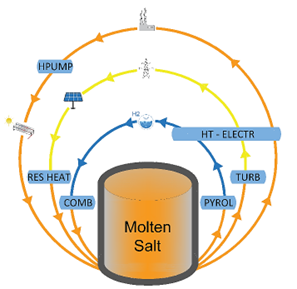Joint Research Activity
Grounded on the Consortium Research Infrastructure (RI), covering already important MS technology questions:

- the use of different salt mixtures on MS driven thermal applications
- the use of MS in the solar concentrator fields
- durability of MS suitable components
- MS thermal energy storage after 2-Tank or Thermocline systems, the Joint Research Activity foreseen in SALTOpower aims at the development of Excellence Research at the Widening partner, further exploiting the use of MS technologies as means of:
- a higher penetration of renewable energy sources in the energy system, by means of stand-alone flexible energy storage systems;
- a flexible interconnection of power and gas energy distribution systems, by means of flexible power and/or gas conversion of medium/high temperature renewable heat.
Having at its core the use of MS as heat transfer and/or storage media, the implementation of power to heat and gas to heat technologies upstream and heat to power and heat to gas technologies downstream the MS core of the system, enables the technical and economic assessment of such a flexible system.
To this end, the JRA will encompass two main research topic contents:
- MS based Carnot battery systems: technical-economic assessment of power to heat and heat to power technologies (resistive heating; high temperature heat pumps; thermodynamic cycles for heat to power conversion); power grid integration modelling;
- MS driven thermo- and electro-chemical H2/syngas production: techno-economic assessment of high-temperature electrolysis; techno-economic assessment of biomass pyrolysis; gas grid integration modelling,
along with a Widening RI upgrade encompassing the added capacity for the physical integration of the related P2X, technologies aiming the testing and demonstration of this concept as the target of the ensuing Joint Proposal envisaged in WP4. This RI upgrade thus entails the design and implementation of the following thermal and/or electric couplings to the existing infrastructure:
- thermal connection to the molten salt hydraulic loop for ensuing connection to thermal inlet/outlet of pyrolysis thermochemical biomass reactor;
- thermal connection to the water/steam hydraulic loop for ensuing connection to thermal inlet/outlet of high temperature electrolysis electrochemical reactor;
- electric connection to power cabinet for electrical feeding of high temperature electrolysis reactor.
The JRA serves as the “test bed” for the implementation of the support measures envisaged in SALTOpower.
Tasks
MS driven Thermo- Electrochemical H 2 /syngas production
Led by ENEA, this task aims at developing the ground know-how for the ensuing development of cutting-edge research in the innovative use of MS technologies in renewable gas production. By means of MS-driven heat and/or power supply as energy source to gas production, has technological focus on:
- High-temperature electrolysis for H2 production;
- Thermochemical conversion of renewable feedstocks (e.g., Biomass pyrolysis for syngas production and/or biogas reforming for H2 /syngas production);
and encompasses a techno-economic assessment of these technological approaches. This task bases the development of 1 PhD Thesis and provides the technical inputs for the Widening RI upgrade.
MS based Carnot Battery systems
Led by UEVORA, this task aims at developing the ground know-how for the ensuing development of cutting-edge research in the innovative use of MS technologies in flexible and high-capacity stand-alone energy storage / inter-grid integrator solutions. Cored in the use of MS Thermal Energy Storage technologies – whose related know-how and RI is already existing in the consortium – has technological focus on:
- integration of renewable energy sources (waste heat, P2X);
- development of Carnot batteries (suitable power cycles, heat exchangers, heat pumps);
and encompasses a techno-economic assessment of these technological approaches. This task bases the development of 1 PhD Thesis.
Distributed Facility
Aiming at the ensuing development of remote R&D activities and services in the Widening RI, this task entails the design, installation and commissioning of a data server for experimental data monitoring, processing and remote access.
Encompassing the monitoring of the different parameters under monitoring in the different assets in the facility, this server system will ensure data processing and backup, enforcing FAIR (findable, accessible, interoperable and reusable) research data management, providing proper data security (including data recovery), thus implemented within a Data Management Plan.
This will allow full control over the infrastructure data (in the integrated asset management policy of the IT Division of UEvora), its sharing interfaces, while minimizing curation and storage/preservation costs. For communication with this server, all existing assets will be adapted in order to guarantee the safe and reliable transmission of data on their status, alarms, operation and performance, etc.
